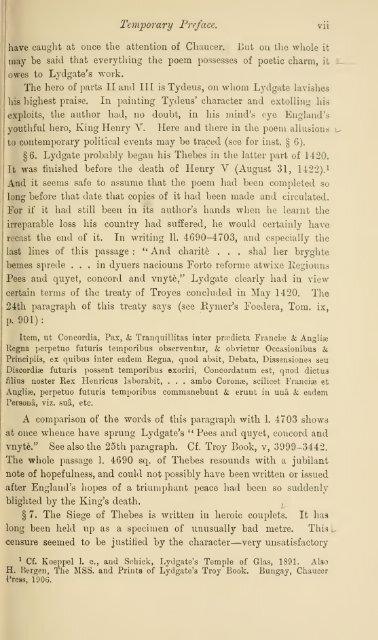You also want an ePaper? Increase the reach of your titles
YUMPU automatically turns print PDFs into web optimized ePapers that Google loves.
i RegnaiPrincipiis,!Discordisei filius1 Angliae,jPersona,IAITemporary Preface.viihave caught at once the attention <strong>of</strong> Chaucer. But on the whole itmay be said that everytliing the poem possesses <strong>of</strong> poetic charm, it l^owes to <strong>Lydgate's</strong> work.The hero <strong>of</strong> parts II and III is Tydeus, on wliom Lydgate hivisheshis highest praise. In painting Tydeus' character and extolling hisexploits, the author had, no doubt, in his mind's eye England'syouthful hero, King Henry Y. Here and there in the poem alhisions uto contemporary political events may be traced (see for inst. § 6).§6. Lydgate probably began his <strong>Thebes</strong> in the latter part <strong>of</strong> 1420.It was finished before the death <strong>of</strong> Henry V (August 31, 1422).iAnd it seems safe to assume that the poem had been completed solong before that date that copies <strong>of</strong>it had been made and circulated.For if it had still been in its author's hands when he learnt theirreparable loss his country had suffered, he would certainly haverecast the end <strong>of</strong> it. In writing 11. 4690-4703, and especially thelast lines <strong>of</strong> this passage ": And charite . . . shal her bryghtehemes sprede ... in dyuers naciouns Forto reforme atwixe RegiounsPees and quyet, concord and vnyte," Lydgate clearly had in viewcertain terms <strong>of</strong> the treaty <strong>of</strong> Troyes concluded in May 1420. The24th paragraph <strong>of</strong> this treaty says (see Rymer's Foedera, Tom. ix,p. 901):Item, lit Concordia, Pax, & Tranquilhtas inter pnedicta Franciiie & Angliaeperpetuo faturis temporibus observentur, & obvietur Occasiouibus kex quibus inter eadem Regna, quod absit, Debata, Dissensiones seufuturis possent temporibus exoriri, Coucordatum est, quod dictusnoster Rex Henricus laborabit, . . . ambo Coronse, scilicet Franciae etperpetuo futuris temporibus commanebunt k erunt in una k eademviz. sua, etc,comparison <strong>of</strong> the words <strong>of</strong> this paragraph with 1. 4703 showsat once whence have sprung <strong>Lydgate's</strong> " Pees and quyet, concord andvnyt^." See also the 25th paragraph. Cf. Troy Book, v, 3999-3442.The whole passage 1. 4690 sq. <strong>of</strong> <strong>Thebes</strong> resounds with a jubilantnote <strong>of</strong> hopefulness, and could not possibly have been written or issuedafter England's hopes <strong>of</strong> a triumphant peace had been so suddenlyblighted by the King's death.§ 7. The <strong>Siege</strong> <strong>of</strong> <strong>Thebes</strong> is written in heroic couplets. It haslong been held up as a specimen <strong>of</strong> unusually bad metre. This „censure seemed to be justilied by the character—very unsatisfactory^ Cf. Koeppel 1. c, and Schick, <strong>Lydgate's</strong> Temple <strong>of</strong> Glas, 1891. AlsoH. Hergen, Tlie MSS. and Prints <strong>of</strong> <strong>Lydgate's</strong> Troy Book. Bungay, ChaucerI'ress, 1906.

















